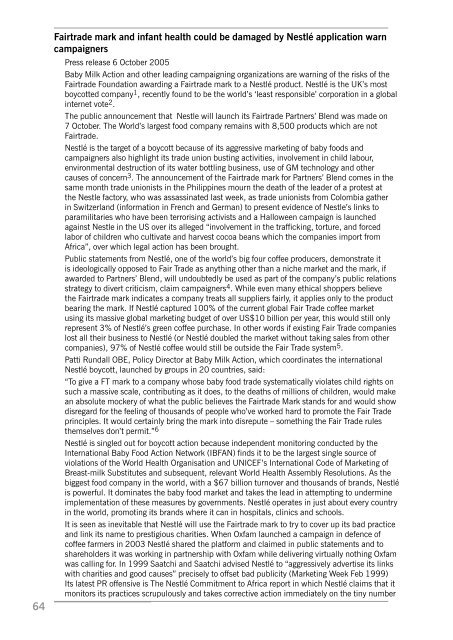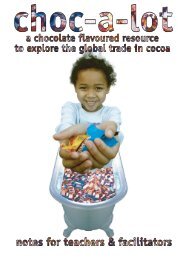Cost of coffee.indd - RISC
Cost of coffee.indd - RISC
Cost of coffee.indd - RISC
Create successful ePaper yourself
Turn your PDF publications into a flip-book with our unique Google optimized e-Paper software.
64<br />
Fairtrade mark and infant health could be damaged by Nestlé application warn<br />
campaigners<br />
Press release 6 October 2005<br />
Baby Milk Action and other leading campaigning organizations are warning <strong>of</strong> the risks <strong>of</strong> the<br />
Fairtrade Foundation awarding a Fairtrade mark to a Nestlé product. Nestlé is the UK’s most<br />
boycotted company 1 , recently found to be the world’s ‘least responsible’ corporation in a global<br />
internet vote 2 .<br />
The public announcement that Nestle will launch its Fairtrade Partners’ Blend was made on<br />
7 October. The World’s largest food company remains with 8,500 products which are not<br />
Fairtrade.<br />
Nestlé is the target <strong>of</strong> a boycott because <strong>of</strong> its aggressive marketing <strong>of</strong> baby foods and<br />
campaigners also highlight its trade union busting activities, involvement in child labour,<br />
environmental destruction <strong>of</strong> its water bottling business, use <strong>of</strong> GM technology and other<br />
causes <strong>of</strong> concern 3 . The announcement <strong>of</strong> the Fairtrade mark for Partners’ Blend comes in the<br />
same month trade unionists in the Philippines mourn the death <strong>of</strong> the leader <strong>of</strong> a protest at<br />
the Nestle factory, who was assassinated last week, as trade unionists from Colombia gather<br />
in Switzerland (information in French and German) to present evidence <strong>of</strong> Nestle’s links to<br />
paramilitaries who have been terrorising activists and a Halloween campaign is launched<br />
against Nestle in the US over its alleged “involvement in the trafficking, torture, and forced<br />
labor <strong>of</strong> children who cultivate and harvest cocoa beans which the companies import from<br />
Africa”, over which legal action has been brought.<br />
Public statements from Nestlé, one <strong>of</strong> the world’s big four c<strong>of</strong>fee producers, demonstrate it<br />
is ideologically opposed to Fair Trade as anything other than a niche market and the mark, if<br />
awarded to Partners’ Blend, will undoubtedly be used as part <strong>of</strong> the company’s public relations<br />
strategy to divert criticism, claim campaigners 4 . While even many ethical shoppers believe<br />
the Fairtrade mark indicates a company treats all suppliers fairly, it applies only to the product<br />
bearing the mark. If Nestlé captured 100% <strong>of</strong> the current global Fair Trade c<strong>of</strong>fee market<br />
using its massive global marketing budget <strong>of</strong> over US$10 billion per year, this would still only<br />
represent 3% <strong>of</strong> Nestlé’s green c<strong>of</strong>fee purchase. In other words if existing Fair Trade companies<br />
lost all their business to Nestlé (or Nestlé doubled the market without taking sales from other<br />
companies), 97% <strong>of</strong> Nestlé c<strong>of</strong>fee would still be outside the Fair Trade system 5 .<br />
Patti Rundall OBE, Policy Director at Baby Milk Action, which coordinates the international<br />
Nestlé boycott, launched by groups in 20 countries, said:<br />
“To give a FT mark to a company whose baby food trade systematically violates child rights on<br />
such a massive scale, contributing as it does, to the deaths <strong>of</strong> millions <strong>of</strong> children, would make<br />
an absolute mockery <strong>of</strong> what the public believes the Fairtrade Mark stands for and would show<br />
disregard for the feeling <strong>of</strong> thousands <strong>of</strong> people who’ve worked hard to promote the Fair Trade<br />
principles. It would certainly bring the mark into disrepute – something the Fair Trade rules<br />
themselves don’t permit.” 6<br />
Nestlé is singled out for boycott action because independent monitoring conducted by the<br />
International Baby Food Action Network (IBFAN) finds it to be the largest single source <strong>of</strong><br />
violations <strong>of</strong> the World Health Organisation and UNICEF’s International Code <strong>of</strong> Marketing <strong>of</strong><br />
Breast-milk Substitutes and subsequent, relevant World Health Assembly Resolutions. As the<br />
biggest food company in the world, with a $67 billion turnover and thousands <strong>of</strong> brands, Nestlé<br />
is powerful. It dominates the baby food market and takes the lead in attempting to undermine<br />
implementation <strong>of</strong> these measures by governments. Nestlé operates in just about every country<br />
in the world, promoting its brands where it can in hospitals, clinics and schools.<br />
It is seen as inevitable that Nestlé will use the Fairtrade mark to try to cover up its bad practice<br />
and link its name to prestigious charities. When Oxfam launched a campaign in defence <strong>of</strong><br />
c<strong>of</strong>fee farmers in 2003 Nestlé shared the platform and claimed in public statements and to<br />
shareholders it was working in partnership with Oxfam while delivering virtually nothing Oxfam<br />
was calling for. In 1999 Saatchi and Saatchi advised Nestlé to “aggressively advertise its links<br />
with charities and good causes” precisely to <strong>of</strong>fset bad publicity (Marketing Week Feb 1999)<br />
Its latest PR <strong>of</strong>fensive is The Nestlé Commitment to Africa report in which Nestlé claims that it<br />
monitors its practices scrupulously and takes corrective action immediately on the tiny number




